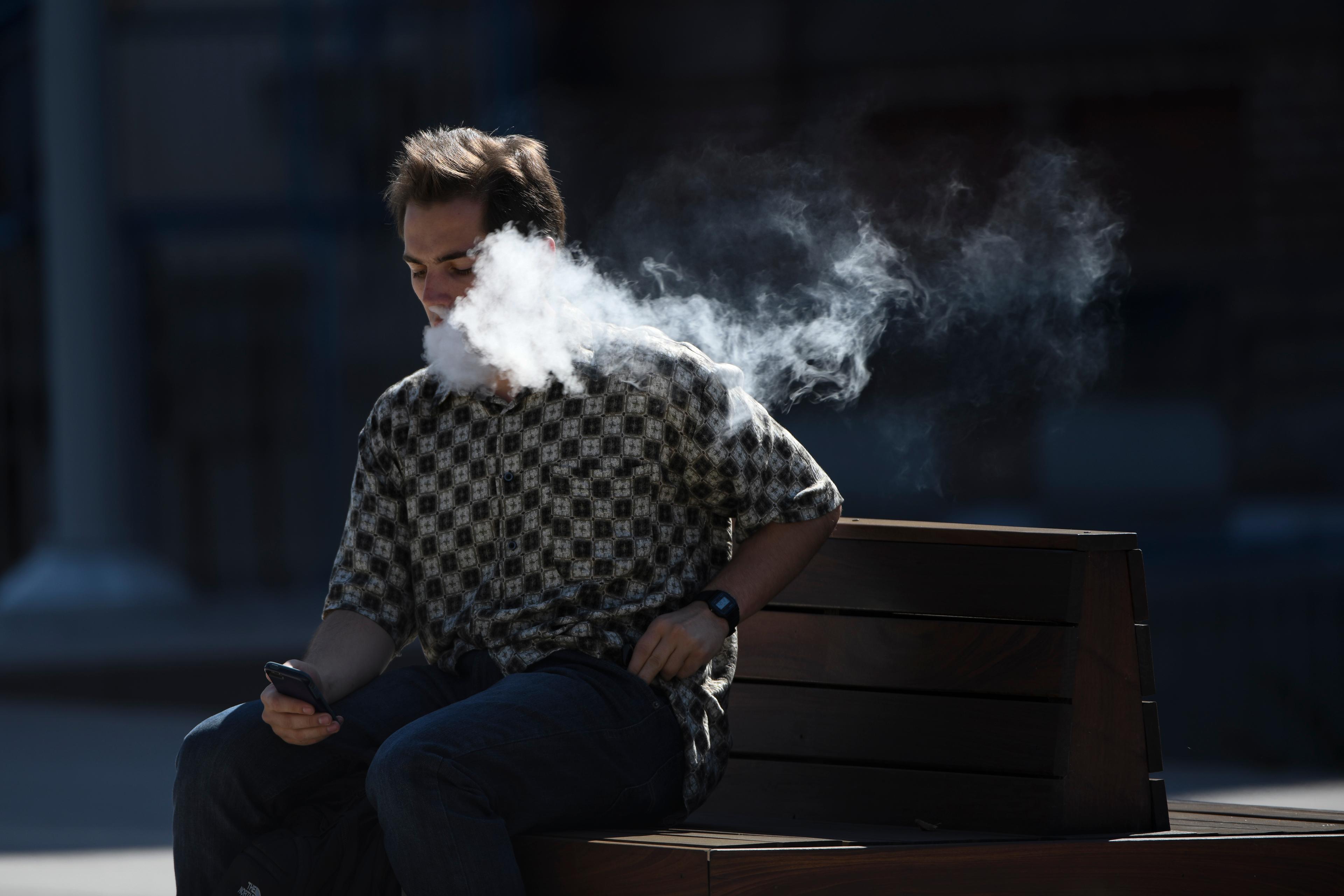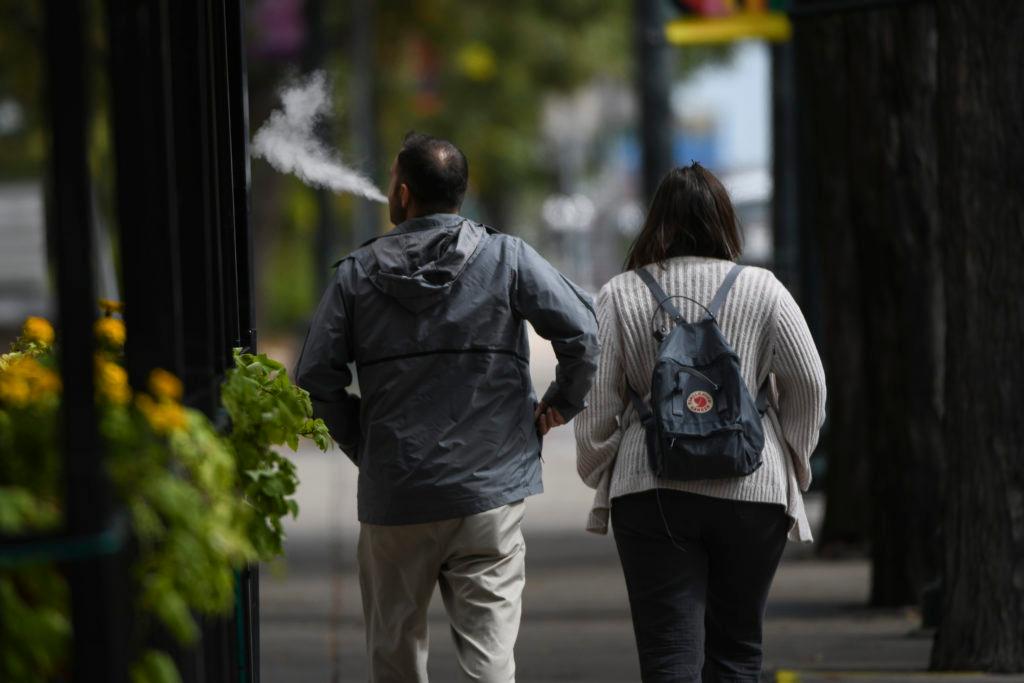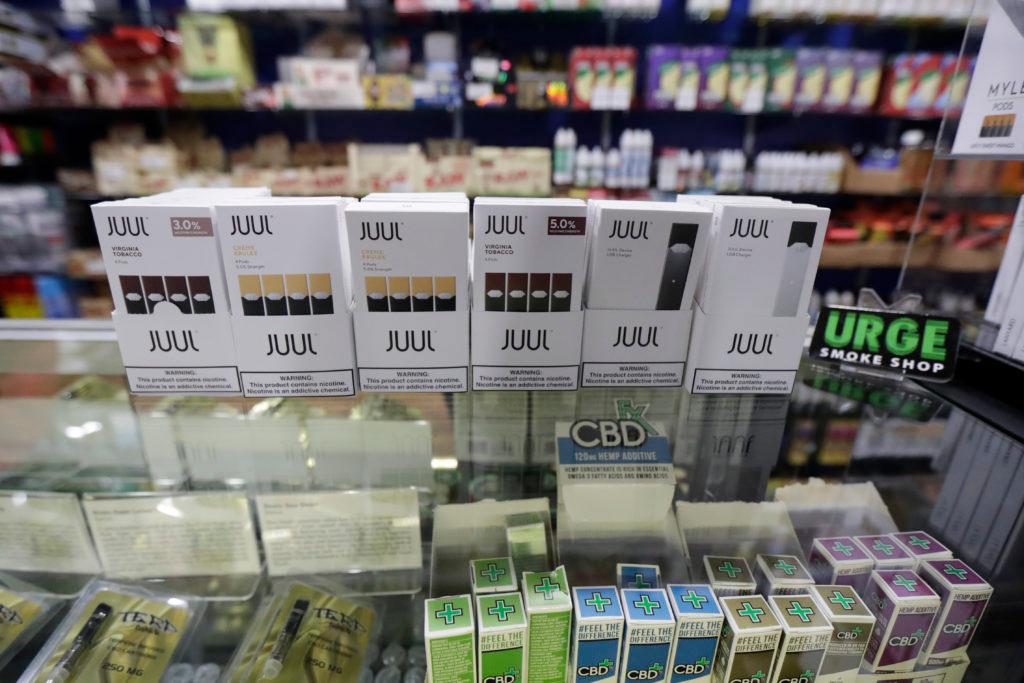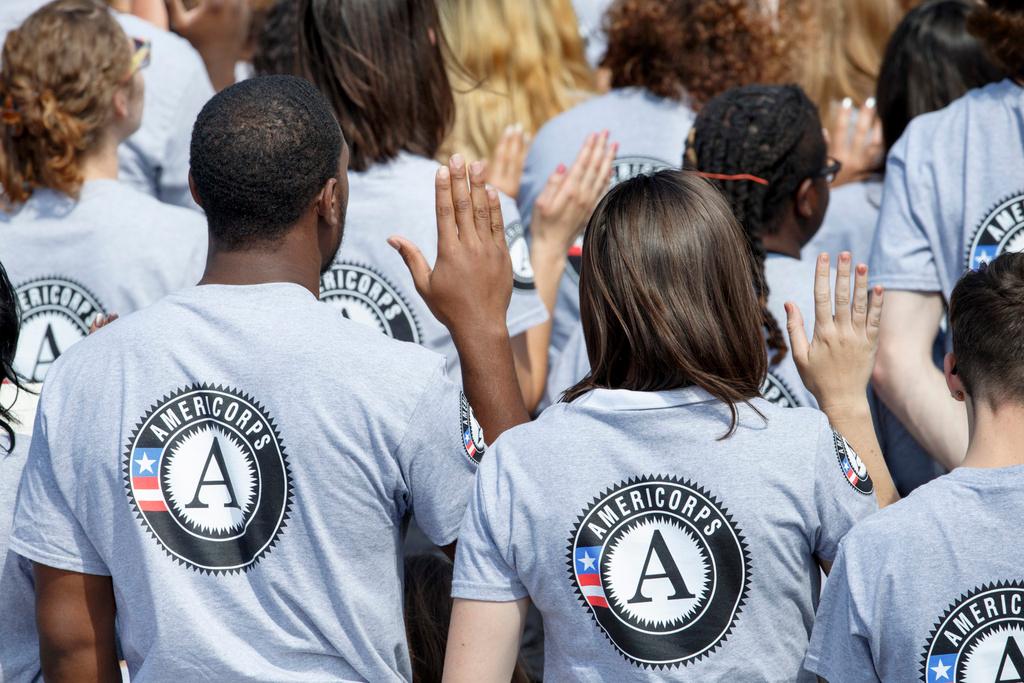
Get on your computer, open up YouTube in a browser, type in the word JUUL and you can find an endless stream of videos like this one featuring a pair of young women welcoming their online audience with a “Hi guys!” before they show how they “make parties a little more fun.”
In the video, they’re vaping, blowing billowy clouds. One uses a JUUL electronic cigarette, the other uses another brand, with a big tank holding vape liquid. “Party mode!” they laugh. You can’t really tell who they are, or if they have any connection to JUUL or any e-cigarette company. “We just chillin.’ We vapin’ and we JUULin’,” one woman said.
This kind of social media marketing is part of what local governments, like Boulder and Eagle counties, are suing JUUL over. They allege JUUL Labs became king, the biggest, most lucrative, e-cigarette company by first aggressively marketing directly to kids. Then young people spread the word themselves by posting to social media.
The litigation claims that helped hook the kids.
Now the U.S. is seeing a sharp increase in teen vaping, of both nicotine and marijuana, according to new federal survey data.
“This really is a page out of big tobacco's playbook, so I think our youth have been marketed to pretty significantly,” said Brittany Carpenter. She’s tobacco education coordinator in Boulder County, the first place in the state to join the litigation. Court papers lay out the case that JUUL Lab’s leaders studied how big tobacco targeted teens, then used the same strategy.
Carpenter said JUUL mimicked traditional tobacco ads to make vape pens stylish and sexy. “Young people in our community think these products are safe and cool, and that's certainly not the message that we want to be sending,” she said.

Her colleague Heath Harmon explained how vaping exploded among young people in Boulder County. A few years ago, cigarette smoking was declining. Now, a third of the county’s teens are vaping nicotine, twice the national average. Harmon, director of health divisions with Boulder County Public Health, said for many it will have long term health impacts. “That's alarming and that's long term use,” Harmon said. “That's addiction to nicotine. That's pretty concerning for us.”
JUUL and its sleek, easy-to-hide devices were a game-changer, Harmon said. JUULs, and copycats made by other companies, now put a whole generation at risk for nicotine addiction. “We're responding in this lawsuit really to make sure that we can hold JUUL accountable for the crisis that we feel they have contributed to or created in our community,” Harmon said.
Boulder county commissioners decided to join what in lawyer-speak is called multi-district litigation. They signed up with a Seattle firm, Keller Rohrback, joining counties and school districts in Washington state to sue JUUL. King and Skagit counties, La Conner School District and Seattle Public schools have all recently sued JUUL.
JUUL spokesman Ted Kwong said the company focused on "earning the trust of society" and is taking steps to combat underage use.
He said JUUL recently stopped accepting orders for Mint JUULpods in the U.S. and “suspended” all broadcast, print, and digital product advertising in the U.S. “Our customer base is the world’s one billion adult smokers and we do not intend to attract underage users," said Kwong.
Gregory Conley, President of the American Vaping Association, calls the litigation “frivolous.” “Ultimately, the only reason these cases are being filed is because plaintiffs' attorneys smell blood in the water,” Conley said.
He said this is about money for lawyers, not stopping teens from vaping. “What you're seeing here is plaintiff's attorneys attempting to bring so many lawsuits that the company has no choice but to settle,” Conley said.
A variety of lawsuits against JUUL are piling up in court. That includes class action and personal injury suits, including one so far filed in federal court in Colorado. Legal expert Neil Mikhija said JUUL now faces at least 200 lawsuits. “The number is growing every day,” he said.
In October, a former JUUL executive sued JUUL alleging it knowingly sold a million tainted or old products to consumers and retailers. School districts in Florida and Kentucky have sued JUUL, so have counties in Pennsylvania and Illinois.
Mikhija is a lecturer at the University of Pennsylvania Carey Law School. He’s represented families in a class-action suit alleging JUUL marketed to minors. He said state and local governments are using lawsuits to shine a spotlight on JUUL’s alleged misdeeds.
It’s a pattern similar to earlier litigation against big tobacco and opioid makers, Mikhija said.
“In many ways, just bringing the issues to light can make a difference and have an impact even while the litigation continues for potentially years,” said Mikhija.
In the opioid litigation, more than two thousand local governments sued opioid manufacturers for helping fuel a crisis that claimed tens of thousands of lives a year in the U.S. The crisis also cost individual local governments millions of dollars and the greater economy trillions.
Now Eagle County too is joining the JUUL litigation, retaining the same Seattle firm as Boulder County. “We intend to hold e-cigarette manufacturers responsible for the harm they have inflicted,” said Jeanne McQueeney, chair of the Eagle County Board of Commissioners, in a comment posted to the county’s website. She called “youth-centered marketing tactics” used by JUUL and others “intentional and despicable.”
Commissioners did not authorize any funds for the suit, said Kathy Parker
Assistant County Attorney. Keller Rohrback’s services are for “a contingent fee less the costs of the lawsuit, and only due if the County receives an award or funds in a settlement,” said Parker.
County health policy strategist Mandy Ivanov said the Eagle River Valley has some of the nation’s highest teen vaping rates. The suit “sends a powerful message,” she said. “For too long, the vape industry, e-cigarette manufacturers, have kind of slid under the radar and gotten through the loopholes that big tobacco is no longer allowed to take advantage of.”
In a major settlement case two decades ago, big tobacco companies were banned from using marketing strategies targeting youth, like the famous Joe Camel ads. But nothing stopped JUUL from doing following in those footsteps.
JUUL and its defenders have long argued its products are for adult users to quit smoking traditional cigarettes. But the litigation alleges JUUL developed a sophisticated ad campaign and social media “influencers” to hook teens.
It started with launch parties around the U.S. in 2015. The litigation argues JUUL held at least “50 highly stylized” parties in cities around the U.S.
It also paid “social media influencers” to post to social media photos of themselves with JUUL devices, using its hashtags, according to the complaint. It hired an ad agency specifically “to identify and recruit social media influencers” that had at least 30,000 followers to, according to an internal JUUL email.
That helped to company “establish a network of creatives to leverage as loyalists” for the brand. The suit states JUUL paid one influencer $1,000 for just one blog post and one Instagram post in 2017.
“Thousands of young people” were given free “JUUL starter kits.”
JUUL posted photos of young people “enthusiastically puffing” on JUULs across their social media channels, most prominently on Instagram. Pop star Katy Perry held a JUUL at the Golden Globe awards.
Last month, Reuters reported JUUL disregarded early evidence its product was proving highly addictive to teens.
Ivanov said JUUL’s messaging worked with kids, and now local communities are feeling the impact. “County government, public health, we take the brunt of these crises, so we are the ones who are motivated to step up and, and say ‘enough is enough,’” said Ivanov.
She predicts with the teen vaping crisis showing no signs of letting up more local governments will step up to sue the e-cigarette market leader.
JUUL isn’t the only company the local governments are suing. The complaint also names Altria Group, Inc. It’s the parent company of cigarette giant Philip Morris USA. which makes the popular Marlboro cigarette. Altria also owns a 35 percent stake in Juul.

The suit also targets a JUUL copycat called Eonsmoke, LLC. It markets products that are compatible with Juul and promoted youth-oriented social media campaigns such as “Doit4juul.”
Eonsmoke had not yet responded to a request for comment.
Mikhija said it’s significant that deep-pocketed Altria is named in the suit. JUUL’s valuation was slashed in half, from $38 billion to $19 billion, after it pulled its popular flavored nicotine pods from the market and it faced increased government scrutiny.
Former FDA Commissioner Scott Gottlieb said JUUL Labs’ products should be removed from the market by the Food and Drug Administration, citing research about JUUL driving teen use of e-cigarettes.
“It’s very clear that Juul can’t keep their products out of the hands of kids,” Gottlieb told CNBC last month. “It could be that this product can’t exist on the market anymore.”
If JUUL gets taken off the market “plaintiffs here are going to be concerned about whether they can actually recover any damages from JUUL,” said Mikhija. But because it’s partially owned by Altria, the cases may continue, he said. “No matter what happened to JUUL, or JUUL goes bankrupt or insolvent, you’ll probably still see the litigation continue,” Mikhija said.
But a spokesman for Altria called the claims against Altria “meritless.” Steven Callahan said it will move to dismiss the cases. “Virtually all of the conduct alleged in the complaints occurred before we had any economic interest in JUUL. Our minority stake in JUUL provides no basis for liability against Altria,” Callahan said.
The litigation comes after dozens of people died and thousands were hospitalized with vaping-related illnesses. Colorado’s health department has now recorded 12 cases of serious respiratory illness associated with vaping. In 10 cases, patients were hospitalized; two of the 12 cases were in Boulder County.
Health officials have linked an additive — vitamin E acetate — found in illegally produced THC vape products to many of the more than 2,000 illness cases nationally.
As of December 10, the CDC reported a total of 2,409 cases of people hospitalized with the lung illnesses associated with e-cigarettes in all 50 states, the District of Columbia, and two U.S. territories. Fifty-two deaths have been confirmed in 26 states and the District of Columbia.
In Colorado, however, half the cases didn't involve THC. Instead, the patients reported vaping just nicotine. Three cases did involve THC only, and in two cases the patient vaped both nicotine and THC. One involved an unknown cause.









